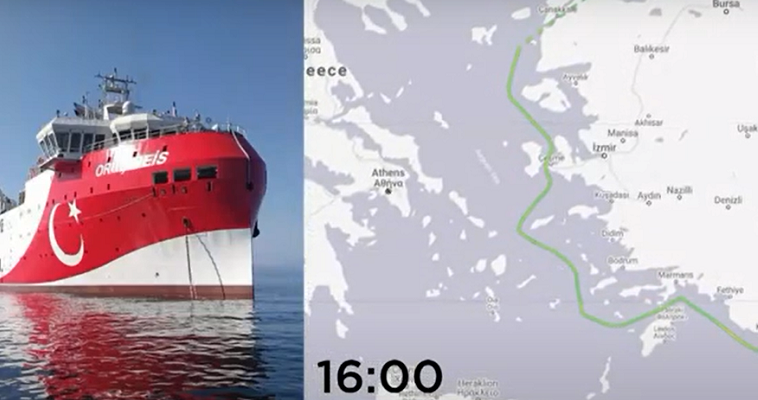Themis Tzimas: The Turkish normalcy of “graying” – From islets to seas
27/07/2020
While we waiting for the Oruc Reis research vessel to act and although the Hellenic armed forces seem to have been adequately mobilized to date, the key features of the Greek political elite and the establishment (short-sighted analysis, communicative management, patronage and subjugation) are beginning to emerge again.
Trapped in a largely communicative management, the Greek government, through friendly media, chooses to look only at what it wants among what is happening in the field of Greek-Turkish relations. Mainly, it singularly deals with the specific incident (in anticipation of the possible exit into open waters of Oruc Reis), in order to send a message of de-escalation inside Greece and therefore show adequate management of the crisis by Prime Minister Mitsotakis.
This anxiety of the Greek side, of course, is interpreted by the other side as a demonstration of weakness and as a willingness for total and unconditional negotiation, conditions that further fuel Turkey’s aggressiveness. Apart from the leaks, then, and any regular moves on the field, the framework (which is unfortunately set by Turkey and not by Greece) is very clear. Circumscribed at the highest level by President Erdogan himself:
Military conflict, or negotiations on all the issues raised by Turkey, which begin and are not limited to the EEZ. The issues that will arise in the context of such a negotiation arise from the formation of the “Blue Homeland” plan and neo-Ottoman nationalism, ie a hegemonic Turkey in the Eastern Mediterranean and the Middle East, surrounded by non-existent or reduced states.
The consistency of provocations
To the above we must include another extremely crucial condition, which has been analyzed in previous articles: the emerging post-Cold War international framework, which is weak and unstable, dominated by controversy and competition. The US is on a path of confrontation with China and in an acute internal crisis.
Russia is trying in part to fill the power gap in the Middle East, but there are clear limits to its power. Germany will not be a useful mediator for Greece. Not that the US would be, of course, but that’s another matter! Therefore, both the importance of NATO membership and the patrons to which the Greek political elite is addicted play an increasingly weaker role in practice.
The very example of Turkey, but also of other countries, proves that military alliances are important when they are nationally and democratically determined and when they are accompanied by a policy of sustainable development of the capabilities of each nation. In this context, Turkey is accelerating developments.
Germany and the United States are urging us to dance to the rhythm imposed by Ankara and Greece seems to be looking for an excuse, even in these days of very immediate crisis, to return to docility. Erdogan’s policy is obvious: he sets up a series of episodes along the Greek-Turkish border, which he turns into points of crisis, of different intensities and types.
This aims to measure the Greek reactions, to wear down the endurance of the Greek side, to normalize an environment of constant, militarized crisis, to “gray” the borders of the two states with the ultimate goal of “graying” Greek sovereign rights, but also of consolidating in all third forces the notion that this situation is “normal” (roughly as the Cyprus issue and the occupation was normalized). But beware: Turkey is probably not seeking a full-fledged military confrontation with Greece.
War or becoming a satellite
But Turkey, like other countries in various kinds of conflicts around the world, does not usually engage in such warfare. They choose a combination of military incidents, internal unrest, diplomatic and economic pressure, and sometimes partial territorial mutilation, in order to impose their will on the other side in an environment of “smoldering” confrontation and often protracted negotiations.
On the contrary, we are unaware that even where there is a military imbalance between competing states, there is greater security and stability when there is absolute determination (even to a degree of audacity) for use and military violence on the part of the less powerful. What is needed, however, is the building of its internal popular potential, with smart bilateral alliances and with openness to the whole world, which, fortunately, is not just the West.
In this case, whether the Oruc Reis leaves port in the next few days or a few weeks is of relatively little value. The important thing is that if something does not change dramatically in the Greek attitude, it will finally do just that. And the drill ship will come out! The Greek side is under pressure either to voluntarily, or not, become Turkey’s satellite, or to fight. If Greece does not change its policy immediately and impressively, it will be faced with only potentially disastrous choices.
And by the way, the fact that in the middle of all these developments, the Greek Prime Minister is photographed with the Tom Hanks family in Antiparos, with the well-known superficiality of the Greek elites, can only be seen as a provocation to all those who guard the border. A little patience, until the 2nd of August, at the very least cannot hurt!





